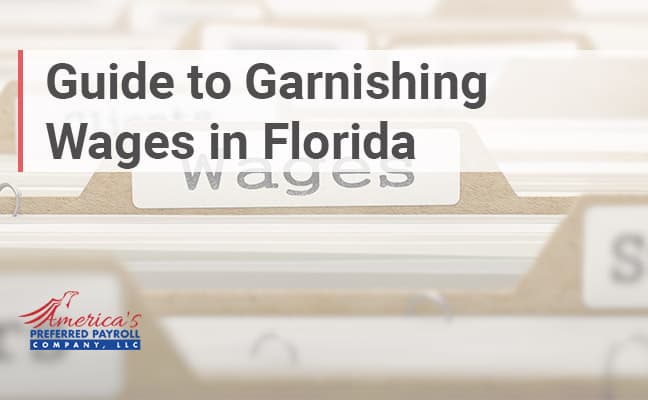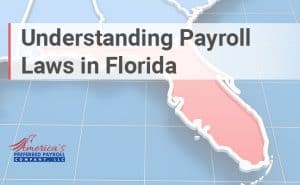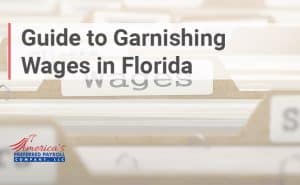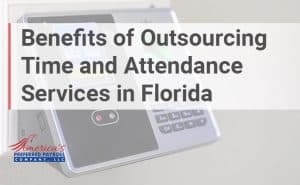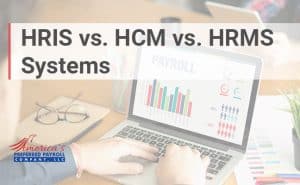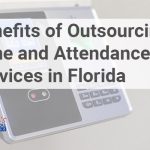Processing wage garnishments have the potential to become frustrating, especially if one or several employees have more than one garnishment. From unpaid student loans and credit card debts to child support payments, alimony, and beyond, wages are garnished for numerous reasons. What matters most is that the garnishment is processed for the correct amount of money and on time. America’s Preferred Payroll does exactly that.
The Wage Garnishment Process
A lost court battle for an unpaid consumer debt, student loan or child support obligation gets the wage garnishment process moving. The defendant’s employer and bank that processes direct deposits are notified of the court’s decision to garnish wages. The formal legal document that triggers the garnishment of wages is referred to as the judgment.
It is up to the payroll processor to alter payroll in accordance with the garnishment notice. However, garnishing wages with accuracy has the potential to become challenging, especially when several employees have garnishments. Remember that some employees have multiple garnishments stemming from child support obligations and numerous unpaid debts. Moreover, each garnishment is an exact figure down to the penny.
Managing the Wage Garnishment Calendar
Wage garnishments eventually come to an end when the debt is paid in full or the child receiving financial support reaches adulthood. Moreover, the state of Florida has set limits in terms of how much money can be removed from each pay period earnings.
Florida acts in accordance with the Federal Consumer Credit Protection Act (CCPA) law. The CCPA established minimum wage garnishment protection rules in the spirit of fairness. According to the letter of the CCPA rules, consumer creditors are limited to taking 25% of weekly disposable earnings or the figure calculated when weekly earnings surpass 30x the nationwide minimum wage. Those who make less than this sum are exempt, meaning their wages cannot be garnished. Employers and employees throughout Florida should be aware that creditors can take 25% of weekly disposable earnings or the sum of the calculation referenced above, whichever is less.
It is also worth noting that some debts are considered “bought paper” in that they are bought by other debt collectors, eventually leading to garnishments or continued legal pursuit. The challenge lies in commencing, continuing and ending the wage garnishment for the correct amount of money through an organized calendaring system. Most businesses have enough going on in-house, making subtle details like wage garnishment scheduling and processing an afterthought.
Instead of sweating all the small stuff of each individual wage garnishment, let the professionals do the work on your behalf.
When a Judgment Isn’t Necessary to Garnish Wages
There is a common misconception that creditors are legally empowered to garnish employee wages without obtaining a court judgment. As an example, it is possible for the IRS, federal government agencies and Florida taxation authorities to garnish employee wages within state boundaries even without a formal court judgment.
Moreover, federal student loan servicers are legally empowered to garnish the wages of Florida earners without a court judgment. Florida employers should also be aware that parents in the state have the agency necessary to collect child support and/or alimony payments that are in arrears.
Wage Garnishment Exemptions
Florida’s exemption calculations run parallel to those at the federal level but for one difference. It is possible for debtors to qualify as the head of the household. The exemption for the head of the household, also referred to as the head of family, is limited to those who pay a minimum of half a dependent’s living expenses.
Those who support minor children, a spouse or even an ex-spouse through alimony are considered exempt from income garnishment if their weekly disposable income amounts to $750 or less. However, income and disposable income are not one in the same. Disposable income is money available for spending after cost-of-living expenses are addressed.
Employers and employees across the state should also be aware that creditors can only garnish the wages of a head of a household with weekly disposable income greater than $750 if debtor consent is given. In some instances, loan recipients waive the head of household exemption when signing loan paperwork. Furthermore, only those who file an affidavit to support their alleged exemption qualification within 20 days of the notice of garnishment will qualify.
Wage garnishment exemptions extend to protected sources of income. As an example, federal law safeguards workers’ compensation indemnity payments, veteran’s benefits and Social Security benefits from wage garnishment.
Contact America’s Preferred Payroll
It merely takes one wage garnishment mistake to create a bureaucratic, judicial and financial nightmare. Lean on the professional payroll providers at America’s Preferred Payroll for wage garnishments and related services. Give us a call today at (813) 865-4205 to schedule a consultation.

